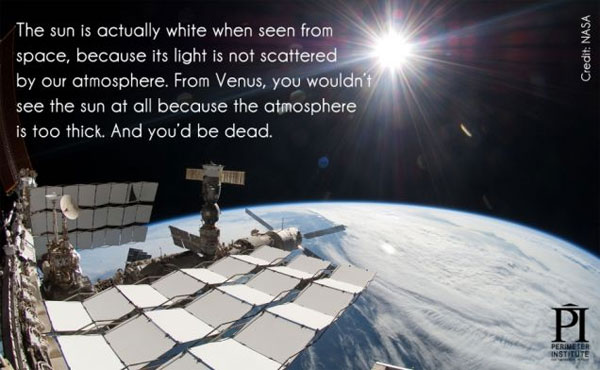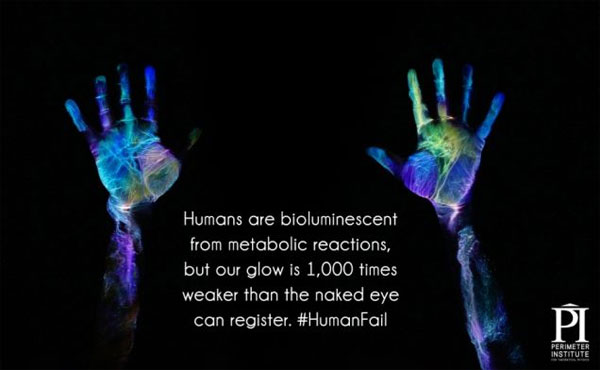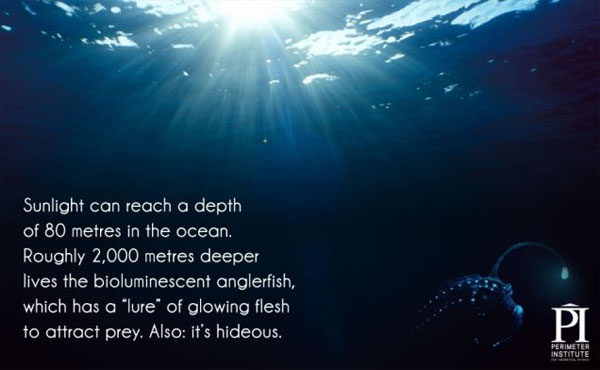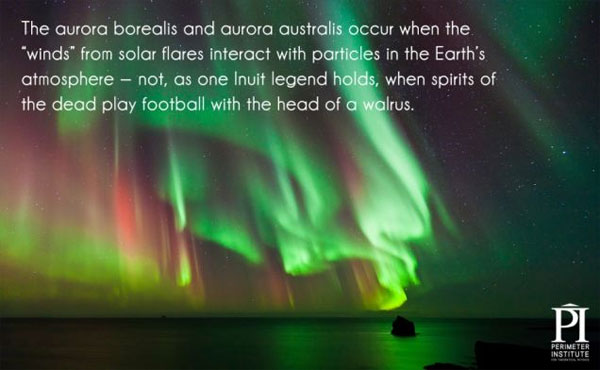20 interesting information about lighting you may not know
Celebrating this light year, the Perimeter Institute for Theoretical Physics sets out twenty facts / useful facts about the light they consider to be the most interesting, please Invite you to read.

1 . When you leave the Earth's atmosphere and look at the Sun, you will see that the sun is white, not yellow, the reason the sun is yellow is the light scattered by the atmosphere. If you're in Venus (Venus), you can't even see the sun because the atmosphere is too thick, and here you'll be deaf.

2 . In fact, humans are able to light themselves, but our light is 1000 times weaker than the human eye's ability to see.

3 . Light can go down to about 80 meters of seawater. At a depth of 2000 meters, there is an angler fish, on its head there are self-luminous spots used to lure predators, this fish looks very bad and scary.

4. The reason the leaf is green is because it reflects blue light and absorbs all other colored light to photosynthesize, if you shine green light into the tree, it will not photosynthesize and will die, Institute PI does not encourage you to kill plants.

5 . Northern aurora occurs when "wind" from a storm from the sun interacts with the earth's atmosphere.

6 . In 1 second, the energy emitted from the sun is enough to heat up 3,200 billion fast meals.

7 . The world's longest-lasting light bulb is California's Centennial Light filament, which has been lit continuously since 1901 and has only been switched off several times due to a power outage.

8. The reflex sneezes when blinding (face up to the sky or the sun will sneeze - this one I have) is a phenomenon that occurs with about 18% -35% of human beings, people have not found The reason, but there is a cure is to wear glasses when looking at the sun.

9. The double rainbow phenomenon occurs because the reflected light 2 times in the water droplets, the small round bridge will have the color of the white color - the big rainbow will have the opposite color as the CBR.

10 . Our eyes cannot see everything, many other animals have more good eyes than human eyes, for example a bee can see ultraviolet rays, a snake can see infrared and so on.

11 . Niagara Falls has been lit with electricity since 1879, at which time the light is equivalent to 32,000 candles, now the light is increased to the equivalent of 250 million candles.

12 . When light passes through different forms of matter it will slow down and be redirected (refracted) so that converging glass is able to light up into 1 point to help you burn some ants (not recommended) burning ants).

13 . The frog's eyes are extremely sensitive to light , with a Singapore researcher using frog eyes to develop an extremely sensitive photon detector.

14 . The reason for the energy-saving LED ball is that it only emits the light of the human eye , and the other types of bulbs such as filament, fluorescent, emit all kinds of light, so it consumes more electricity.

15 . Fireflies emit cold light with nearly 100% efficiency, scientists are studying how to mimic this type of light for the next generation of high-performance LED.

16 . To study how the eyes perceive colors, when Mr. Issac Newton pinned the wooden needle into his eyes to see if the color came from a good object coming from my eyes (Actually, it came from both. , rod cells react to the corresponding colored light waves).

17. If suddenly the Sun turns off the stove , then it will take 8 seconds or 17 seconds for us to know, but don't worry, the sun has enough energy to light up another 5 billion years.

18 . Although it is called the Black Hole - the Black Hole of the Universe, but in fact the black hole is the brightest place in this universe , its energy is greater than the galaxy containing it.

19. The rainbow is created when the light enters the droplets in the air , the light is refracted and reflected inside the droplet and then refracted when it comes out of the water droplet, this activity creates out of the rainbow.

20. Light also has inertia, people are studying how to use this energy to help the journey deep into the universe is more economical and efficient.
21. Photons can create shock waves in water or air, similar to a supersonic explosion. Nothing can move faster than the speed of light in a vacuum. However, light slows down in air, water, glass and other materials because photons interact with atoms, causing some interesting consequences.

Most types of light are not visible to the human eye.
22. Most types of light are not visible to the human eye. Color is the way our brain interprets the wavelength of light: the distance traveled by light before the wave itself repeats itself. But the colors we see - called 'visible' or 'optical' - are just a small part of the entire electromagnetic spectrum.
23. Scientists can perform measurements on individual photons. Light consists of particles called photons, packages of electromagnetic fields carrying a certain energy. With experiments that are sensitive enough, you can count the number of photons or even take measurements on individual photons. The researchers also frozen the light temporarily.
- Luminaire cum solar charger
- What is Interact Sports and what are the possibilities?
- Disinfection lighting system
- Most of us have long lit candles incorrectly
- OLED bulbs - lighting equipment in the future
- Tube inflatable like balloons
- 'Intelligent' lighting system
- Automated lighting system for automobiles
- Flowers bloom in test tubes
- SmartLight system can direct light into hidden buildings
- Modecom project: display electronic information on all products
- Fluxo - Smart light bulbs can illuminate a colorful area
 'Fine laughs' - Scary and painful torture in ancient times
'Fine laughs' - Scary and painful torture in ancient times The sequence of numbers 142857 of the Egyptian pyramids is known as the strangest number in the world - Why?
The sequence of numbers 142857 of the Egyptian pyramids is known as the strangest number in the world - Why? History of the iron
History of the iron What is alum?
What is alum?